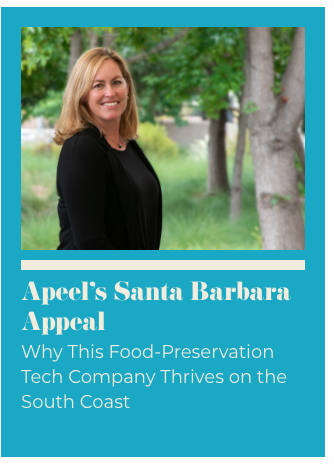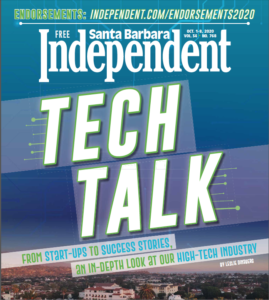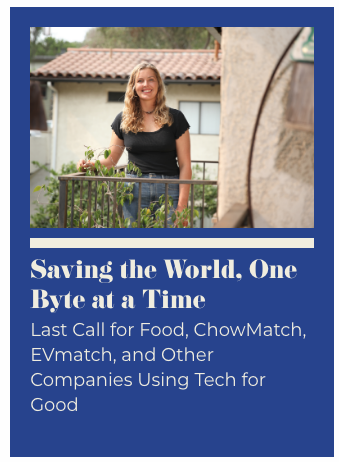In a creation story fit for a feel-good film, the food-preservation company Apeel Sciences was founded by UCSB grad student James Rogers when he heard a radio story about global hunger while driving through California’s lush farmlands. He wondered how so many could be so hungry when there was much food around.
Upon learning that the culprit is spoilage, the materials science PhD candidate developed a product—made entirely from natural things in the food we already eat—that slowed down the rotting of various fruits and vegetables. Rogers won UCSB’s New Venture Competition, and the seeds of Apeel quickly began to sprout, funded in part by the Bill & Melinda Gates Foundation due to the promise of fighting malnourishment around the world.
That was around 2012. Fast forward to today, and Apeel, which is headquartered in Goleta and employs nearly 200 “Apeelers,” is growing like crazy, developing products for dozens of produce categories and working with a range of partners, from small organic growers to the world’s largest food brands.
In late August, Apeel, which is currency valued at more than $1 billion, announced a partnership with the largest German retailer that will put Apeel-treated avocados and oranges in more than 11,000 EDEKA and Netto stores.
And they’re just getting started. I spoke with “Chief People Officer” Megan Opp about Apeel’s appeal.
WHY IS EVERYONE SO EXCITED ABOUT YOUR COMPANY? The technology and product are so innovative and world-changing. We are thankful for UCSB for providing a strong pipeline of incredible talent, which of course includes our founders. People have the opportunity to positively change how the world accesses and enjoys fresh produce. What’s exciting is that it all started in this beautiful community of S.B. and has grown very quickly into a global company.
Most of our R&D happens right here at headquarters, but innovations can come from any part of the world. You can be based in Santa Barbara but also have opportunities to travel and work in new places. This is one of the most globally mobile companies I’ve seen, where we’ll give these opportunities as a way of sharing our company values and culture in different locations and also as a way to grow in one’s career and skills and global mindset.
WHAT ARE SOME HIGH AND LOW POINTS OF BEING A BIG EMPLOYER HERE? We’re extremely fortunate to have great access to top tech talent who have chosen to study and live in the Santa Barbara area. We’ve also been able to attract talent from surrounding metro areas, including L.A. and the Bay Area. We always notice an uptick in applications from the East Coast and Midwest during winter months! Like any region for tech talent, Santa Barbara isn’t without its challenges. Santa Barbara’s cost of living and housing availability is one.
WHAT ARE SOME CULTURAL DIFFERENCES IN SANTA BARBARA COMPARED TO OTHER TECH HUBS? Our employees are very philanthropic, connected with nature, and embrace all of the outdoor adventures and amenities this area has to offer.
DOES BEING A HUMANITARIAN-FOCUSED COMPANY LEAD TO A CERTAIN TYPE OF EMPLOYEE? We are a global company that hires talent based not only abilities but the aligned belief in our mission—enabling a world that works with nature; we use food to protect food—and wanting to be part of something that will change the world. We hire and reward people with strong alignment with our values, which include humility and teamwork. We support each other and want to see us all succeed so that Apeel produce will be available throughout the world.
HOW ARE YOU HANDLING HIRING DURING COVID? Food waste is a global crisis, and we are continuing to aggressively staff up to be able to tackle this issue head-on. Even through this challenging time of COVID, we’ve come up with creative ways to create a welcoming virtual environment for candidates and new hires. We always put people first and have created additional programs to support our working parents and caregivers and all of our employees during these challenging times.
We feel so fortunate to be based in the Santa Barbara area with so many benefits within our reach! apeelsciences.com
Tech Talk Special Issue for the Santa Barbara Independent, originally published on October 1, 2020.
To read the issue as it appeared in print, please click here, Tech Talk 768_10_01_20



